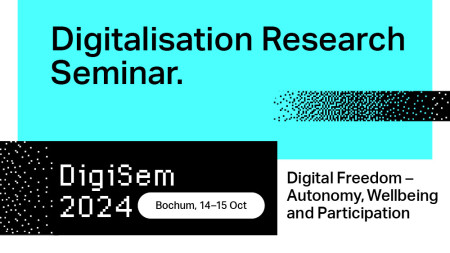DigiSem 2024 - Digitalisation Research Seminar

Date: 14.10.2024 - 15.10.2024
Workshop / training
Format: onsite
Location: Bochum, Germany
Event Fee: Free
Organizer(s):
Bavarian Research Institute for Digital Transformation (bidt)
,
Center for Advanced Internet Studies
,
Hans-Bredow-Institut
,
Weizenbaum Institute for Networked Society
DigiSem is a bi-annual workshop for doctoral and postdoctoral researchers, organised by bidt, CAIS, HBI and WI. The second edition of DigiSem focuses on a pressing subject that has also been selected as topic of the Science Year 2024: Freedom. DigiSem takes into focus what digital freedom means and what impact this may have on our lives with respect to more or less autonomy, wellbeing and possibilities to participate in public life. DigiSem is a perfect place to meet other young researchers related to your topics and provides a place to discuss results, ideas and problems relating to the special theme in a smaller group. The workshop will include a keynote by an expert on the field of ethics in digitalisation. Further, there will be focus sessions on specific aspects of the workshop’s overarching theme, including the discussion of the statements postulated below. A Podcast-Team will accompany the event. Keynote The keynote at DigiSem 2024 will reflect on the topic of ‘Freedom and digitalisation’. It will be delivered by Prof. Dr. Sebastian Weydner-Volkmann who is Junior Professor for Ethics of Digital Methods and Technologies at the Institute for Philosophy I, Ruhr University Bochum. He is a Principal Investigator in the graduate academy SecHuman on cyber security and – among others – has worked on the ethical implications of passenger controls and data-based profiling. Topics We invite submissions addressing one of the three main topic-areas. In your abstracts, please also share your thoughts on one of the postulated statements, as we are encouraging an open discussion including participants’ own experiences and opinions. Topic 1: Autonomy How autonomous are we, or do we want to be, in dealing with data and technologies? What choices do individuals, companies and institutions have in the face of BigTech players? Is more security in the digital world bound to trade-off with individual freedom? Regarding freedom of research in particular – ff will artificial intelligence increase our freedom to use and leverage data, tools and networks? Or will their costs and access restrictions have an inhibiting effect on research or benefit only a small subset of researchers? Statement 1: The more autonomy the better. Statement 2: Digital autonomy fosters freedom of research. Topic 2: Wellbeing Do we have more freedom (e.g. for other activities, leisure time, empowerment) through digital solutions/AI in the world of work and private life – or less? How do we measure digital freedom in terms of wellbeing or happiness? Do we still have the choice to live an analogue/digital autonomous life? Statement 1: Digital freedom enhances our personal well-being. Statement 2: Digitalisation saves time. Topic 3: Participation Which means do we have to shape digital infrastructures through active participation? How can civil society’s role as active, self-determined power be supported in different political systems and market contexts? What impact does (a) restricted access to media and technologies have on democratic processes and opinion forming/building, either on a local or on an international scale? Is free access to digital space for everyone a goal that can and should be achieved? Statement 1: Digitalisation promotes democratisation. Statement 2: Participation should not require digital access.
Call for Papers
Digitalisation Research Seminar (DigiSem 2024) Digital Freedom - Autonomy, Wellbeing and Participation
Deadline: 10.07.2024
Post created by: Lymor Wolf Goldstein